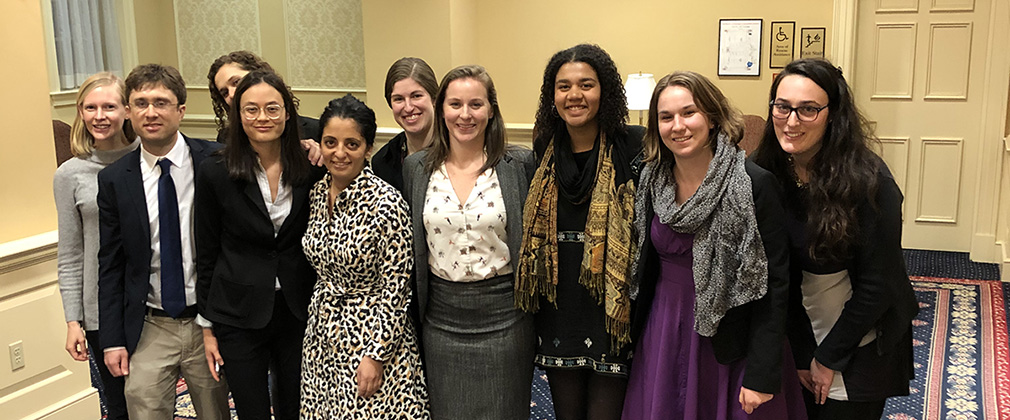CLF Supports Maryland Food Policy Legislation
ANNAPOLIS—March 24, 2020. Maryland’s legislative session unexpectedly ended on Wednesday, March 18, as a protective measure due to the COVID pandemic—but in the weeks preceding, the Johns Hopkins Center for a Livable Future (CLF) was able to make significant headway on a number of important bills that impact our food system. One of these bills is the Certified Local Farm Enterprise Bill, which is currently on Governor Larry Hogan’s desk for final approval. The Certified Local Farm Enterprise Bill would create the certified local farm enterprise program and an office in the Maryland Department of Agriculture to encourage state agencies to achieve an overall goal of purchasing 20 percent of food from certified local farm enterprises. Public four-year universities, such as Morgan State University, would be included under the umbrella of state agencies. Approximately 200,000 students attend public four-year institutions in Maryland. Increased local procurement will allow farmers to access new and larger institutional markets and revenue streams for their operations. In addition, this bill creates a grant fund (though it is nonbudgeted) to establish and operate food aggregation, storage, processing and distribution sites across the State — for example, this fund could support the creation of a new food hub. As I stated in my testimony in front of the Senate Education Health and Environmental Affairs Committee in support of this bill, on February 25th, “when we connect Maryland farms to large institutional customers like schools, we create an environment where Maryland farmers, especially small and mid-sized producers, can thrive.” Though this is a voluntary program, it is significant because it would restructure state agency procurement procedures to support local food procurement. We hope that Governor Hogan will sign this bill into law.
In addition to my own testimony, several other Center staff members made their voices heard as expert witnesses this legislative session in Annapolis, the state capital, on policies ranging from healthy food access in correctional facilities to a moratorium on new and expanding industrial poultry operations in the state. Some of the proposed legislation could be reintroduced next January.
Erin Biehl and Raychel Santo provided testimony in support of the Maryland Green Purchasing bill, which would target the reduction of greenhouse gases from Maryland’s food purchases by 25 percent by 2030 from a baseline established by 2023.
This bill would allow the Maryland Green Purchasing committee, in consultation with the Department of General Services and the Department of the Environment, to determine the methodology for tracking food-related greenhouse gas emissions from state agency purchases (using existing methodology such as the World Resource Institute’s tracking protocol). In addition, the bill would allow the Maryland Green Purchasing committee to establish best practices for State agencies to reduce greenhouse gas emissions associated with food purchases.
As Raychel Santo stated in her testimony, “many studies, including a study my colleagues and I recently published, show that a small number of emissions-intensive foods account for the majority of the emissions associated with our diets.”
Erin Biehl also urged the House Health and Government Operations committee to consider that, “encouraging a shift away from emissions-intensive foods and towards diets that are higher in plant-based proteins, fruits, and vegetables is critical for planetary and human health.”
The Maryland Green Purchasing bill might have had a good chance of passing in this session under normal circumstances. Unfortunately, the disruption of the session by the pandemic led to the bill being unsuccessful this legislative session.
Daphene Altema-Johnson, of the CLF Meatless Monday team, also had the opportunity to testify in support of a bill that would require correctional facilities and hospitals to implement minimum mandatory standards for inmate food services including requiring plant-forward meals to be available to all inmates among other provisions. In 2011, correctional facilities in Maryland spent $3 million on hospitalizations of inmates for heart failure, renal failures, strokes, and acute respiratory failure. As Daphene stated in her testimony, “taking preventative measures such as adopting basic lifestyle changes, like a plant-rich diet, will not only decrease hospitalization and prescription costs, but will also lower the risk of heart diseases, diabetes, obesity and some cancers.”
CLF also provided testimony in support of a bill that would require the state to implement a moratorium on new and expanding industrial poultry operations. The Water Pollution Control - Discharge Permits - Industrial Poultry Operations bill would prohibit the Maryland Department of the Environment from issuing a “discharge permit” to new or expanding operations that produces 300,000 or more broiler chickens annually. During contentious debate over the bill, CLF played an important role in emphasizing the negative public health impacts that these operations pose to workers and communities.
I had the opportunity to testify in support of this bill in both the House and Senate environmental committees, and in my testimony, I made sure that legislators received a clear message on the public health impacts of poultry concentrated animal feeding operations (CAFOs), stating, “public health practitioners across the country have determined that CAFOs pose a risk to the public’s health… there is consensus on the link between negative environmental and health outcomes that result from poultry CAFOs.”
Though the future of much of this legislation has yet to unfold, CLF’s voice urging policy makers to think critically about the public health implications of policies that shape our food system across the state held steadfast in Annapolis this legislative session.
Though the climate-friendly and correctional facilities procurement bill and the CAFO moratorium bill did not pass through the legislature, legislation is a long game. By presenting ideas now, we’re planting the seeds for years to come.
Image: Supporters of Senate Bill 478 targeting greenhouse gas emissions reductions through food procurement, February 19, 2020.
